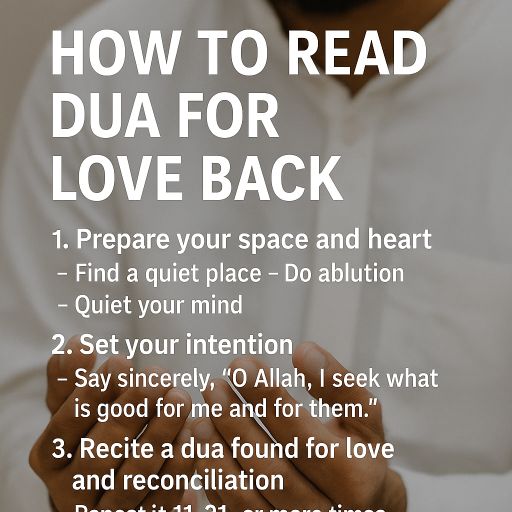How To Read Dua For Love Back
I’m going to start with a little confession: a few years back I sat alone in my room at 2 a.m., staring at my phone, wishing things were back the way they were. I replayed memories, asked myself “Was I too proud? Did I mess up?” – and finally, whispered a simple prayer. I wasn’t sure it’d work. But I did it anyway. Because the ache was real. How To Read Dua For Love Back
If you’re here, maybe you’re in that moment too: that strange mix of wanting someone back — and hoping, somewhere deep down, for peace if they never come. This guide is for you. It’s about how to read a Dua For Love Back in a way that’s honest, grounded and connected to your heart. I won’t pretend it’s magic. It may not fix everything overnight. But it can help you walk through the pain, with your heart open and your faith intact.
Why this matters
When a relationship frays, the tear isn’t just about two people—it’s about hopes, shared laughs, plans that now feel distant. You’re left asking: Can the one I love come back? And should they come back? Reading a dua becomes more than reciting words—it becomes a conversation. With yourself. With the Divine. With the possibility of healing.
I discovered that it wasn’t just about getting someone back—it was about finding myself again. And in that space, the dua changed shape: from “make them come back” to “make me ready, or make what’s best happen”.

Step-by-step: How to Read Dua For Love Back
Here’s a simple, heartfelt way to do this. You can adapt it. The language of your heart matters more than perfection.
1. Prepare your space and heart
- Find a quiet place (yes, even if it’s 10 minutes in a busy house).
- Do ablution (wudu) if you can — it helps you feel physically ready for the moment.
- Quiet your mind. Accept that you’re nervous, hopeful, scared. All valid.
2. Set your intention
Look at yourself in the mirror or close your eyes. Say:
“O Allah, I’m here sincerely. I seek what is good for me and for them. I trust in Your wisdom.”
This matters. A dua made with a fuzzy heart is like a song sung on mute.
3. Recite a dua found for love and reconciliation
One that many refer to:
“O Allah, bring our hearts together. O Allah, soften hearts between us.” Surah Juma+1
Another:
“O Allah, I ask You by Your mercy which encompasses all things, to forgive me and the one I love.” Surah Juma+1
You can repeat it 11, 21, or more times—what feels manageable. Consistency counts.
4. Speak from your heart
After the specific dua, add your words:
“Please, make things clear. If this is meant, bring us together. If not, show me Your path.”
Don’t worry about eloquence. Speak like you’re talking to the Divine who already knows your thoughts.
5. Make good effort
Dua isn’t a substitute for effort. It’s part of a whole. Reach out (when appropriate), show kindness, reflect on your own mistakes. A relationship heals when both sides lean in, even if softly.
6. Trust the path and be patient
Often the hardest: waiting. You might expect a result right away. Maybe that happens. Or maybe it doesn’t. Either way: keep your heart firm in trust. The journey matters. Reddit+1
What kind of results should you expect?
Here’s the truth: you might see your phone ping sooner than you think. Or you might not. And that’s okay. Because the real shift happens in you — your acceptance, your readiness, your quiet strength.
If they return, wonderful. If they don’t: you’ll still be in a better place than yesterday. That’s the hidden win.

Common questions I hear (and felt myself)
Q1: Will the dua definitely work?
A: No guarantee. But when it comes from sincerity and happens alongside honest effort, it shifts things.
Q2: How often should I recite it?
A: Whenever you have space in your heart and day. Many pick morning or before sleep. It’s not about numbers—it’s about presence.
Q3: Can I ask God to change them?
A: It’s better to ask for their heart to soften, for understanding, for the best outcome—not to override their free will.
Q4: What if I make mistakes in how I treated them?
A: Own it. Let your dua include: “Forgive me. Make me better.” That honesty matters.
Q5: Doesn’t this feel like begging?
A: Maybe. But there’s dignity in vulnerability. You’re simply opening your heart—not forcing an outcome.
Q6: When should I stop?
A: When your heart has found peace—whether together or apart. There’s a quiet signal inside you when you’ve done your part.
Final heart-to-heart
You’re doing something brave: facing love’s aftermath, wanting healing. And reading a dua in this way is a form of self-respect. It says: My heart matters. My hope matters. My feelings matter.
So go ahead — call out with your voice, sit quietly, let the words land. And whether the love comes back, or a different kind of love arrives (for yourself, for your future), you’ll be changed. In the best way.
If you like, I can help you with a ready-to-print dua sheet you can use daily. Would you like that?

